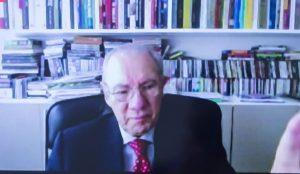(MENAFN- Brazil-Arab News Agency (ANBA)) Marcos Carrieri
São Paulo – The world that's emerging from the coronavirus pandemic should be more and more connected through technology-based relationships, and ever-more sustainable and integrated. So said the speakers in the panel 'The Future is Now – Perspectives for Brazil and the Arab countries in the new global situation,' held this Monday (19) during the Economic Forum Brazil & Arab Countries , hosted by the Arab Brazilian Chamber of Commerce (ABCC).

Ghadah Alharthi moderated the discussion
The panel was moderated by professor Ghadah Alharthi, a Middle East expert at the Central Saint Martins University of the Arts London. She challenged the panelists with the assertion that 'Working in isolated fashion in the world is not reasonable from a political and economic standpoint, and the health crisis has shown us that much.'
International Relations and Foreign Trade Institute CEO ambassador Rubens Barbosa went over the current international geopolitical context. He said United States-China tensions are escalating, and remarked that three challenges are facing global international trade right now: new trends on international markets; the outlook for the World Trade Organization (WTO); and mounting uncertainty in international trade. 'We should see tension in agribusiness, on the supply and demand sides, and Brazil is paying attention to food security and health safety issues.'

Barbosa went over the global geopolitical context
The Arab League's assistant secretary-general for Economic Affairs, Kamal Hassan Ali, said the new order that is emerging from the pandemic will encourage the sharing of ideas, opportunities, and experiences. Regarding Brazilian-Arab relations, he said opportunities are available in maritime trade and in increasing trade volumes. 'Trade is still timid; it revolves around phosphates and oil (on the Arab side) and grains, meats and sugar (on the Brazilian side), and the volume of that trade does not live up to the regions' potential. More investment is needed.'
Regarding investment, HBG Holding CEO and 2015 Nobel Peace Prize winner Ouided Bouchamaoui stressed the need to build ties in diplomacy and trade, and mentioned Tunisia as a key factor in building relations between countries: 'The pandemic has shown that we need more solidarity, and that the answers will not come at the individual level. We need to think together,' he said, remarking that the shared goal right now is to enable investments

Ouided said Tunisia is a hub
'Everyone knows that Brazil is the biggest and one of the fastest-growing economies in South America, with plenty of opportunities. Investment is in order, not only in trade, but also in partnerships and joint ventures. Tunisia has agreements in place with European countries, and it can be a hub into the European market. We wish to enhance our partnership with Brazilian companies, so that together we may find new opportunities and markets,' said Ouided, who also chairs the Tunisian Union of Industry, Trade and Handicrafts (UTICA).
Echoing Ouided's assertions, the CEO of Siemens Oman, Claudia Massei, said Tunisia can be a gateway to Europe and Africa for Brazilian companies, as can Oman to Asia and the Middle East. She noted, however, that Brazil's partnership and knowledge-sharing with the Arab countries should extend far beyond trade, because all these countries are faced with the need to create an environmentally sustainable world, and they can lead the way in doing so.

Claudia Massei is a Brazilian working in Oman
'The sharing of knowledge can help. Oil isn't that relevant anymore. There will be a shift toward solar power, for instance, which has unique features in Brazil and the Arab countries, and they share similarities. They could share knowledge on wind turbines, solar panels and green hydrogen.'
Another major subject was digitization and its various platforms: meetings, shows and events, and payment methods. Afreximbank chief economist and Research and International Cooperation director Hippolyte Fofack said there are still issues in international payments, wire transfers and remittances, and those challenges can be addressed through digitization. 'More than 10% of investment in digitization can lead to 4% growth in the world economy,' he said.
He also sees deep changes underway in global supply chains, a trend towards domestic manufacturing of some items, such as respirators and health equipment, and remarks that Brazilian-Arab relations are yet to live up to their full potential. 'Covid-19 brought about a tectonic, and Brazil and the Arab countries are integrating those changes into its growth process.'
Check out the full coverage on ANBA .
Special report by Marcos Carrieri for ANBA
Translated by Gabriel Pomerancblum
MENAFN1910202002130000ID1100983909
Legal Disclaimer:
MENAFN provides the information “as is” without warranty of any kind. We do not accept any responsibility or liability for the accuracy, content, images, videos, licenses, completeness, legality, or reliability of the information contained in this article. If you have any complaints or copyright issues related to this article, kindly contact the provider above.